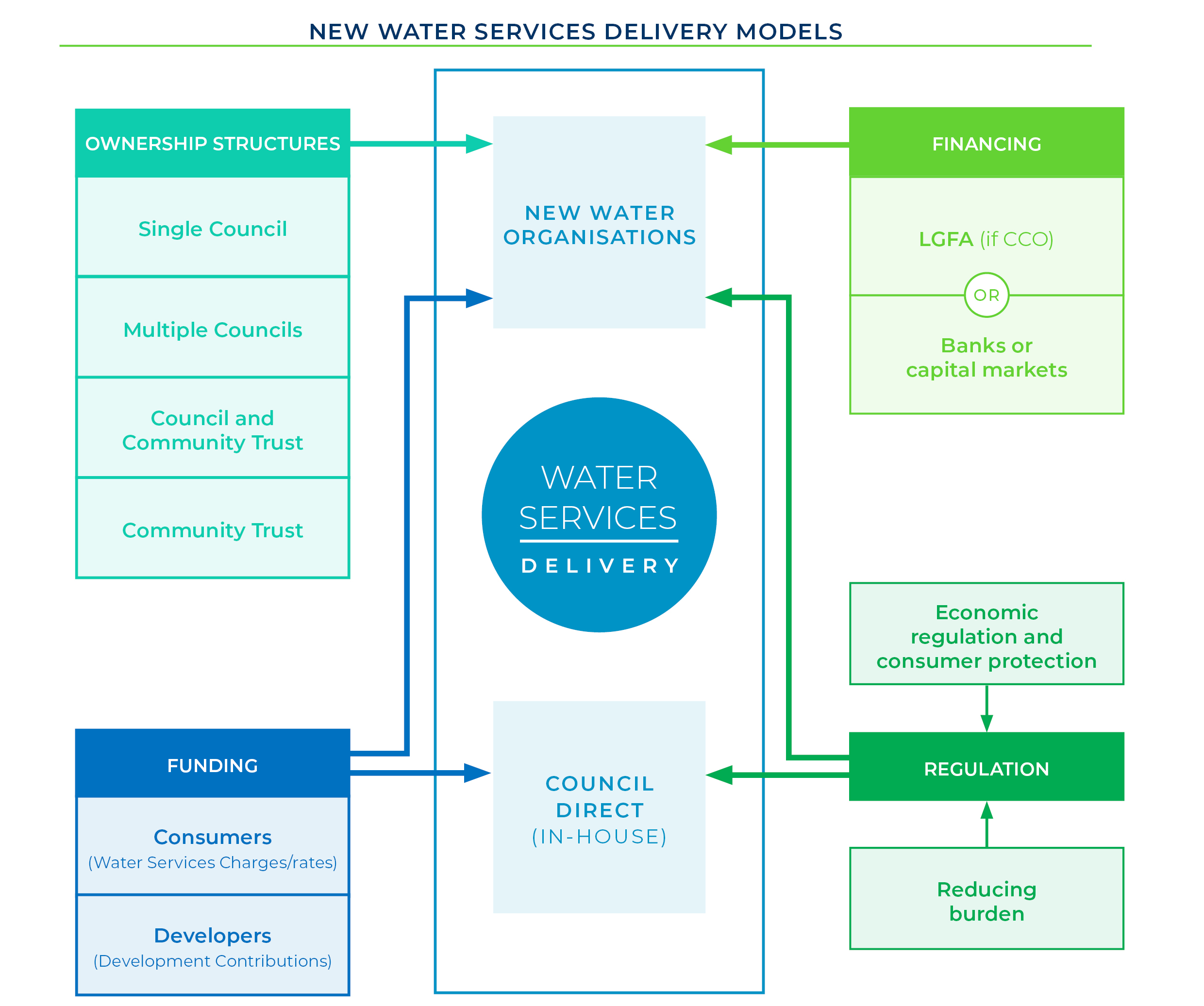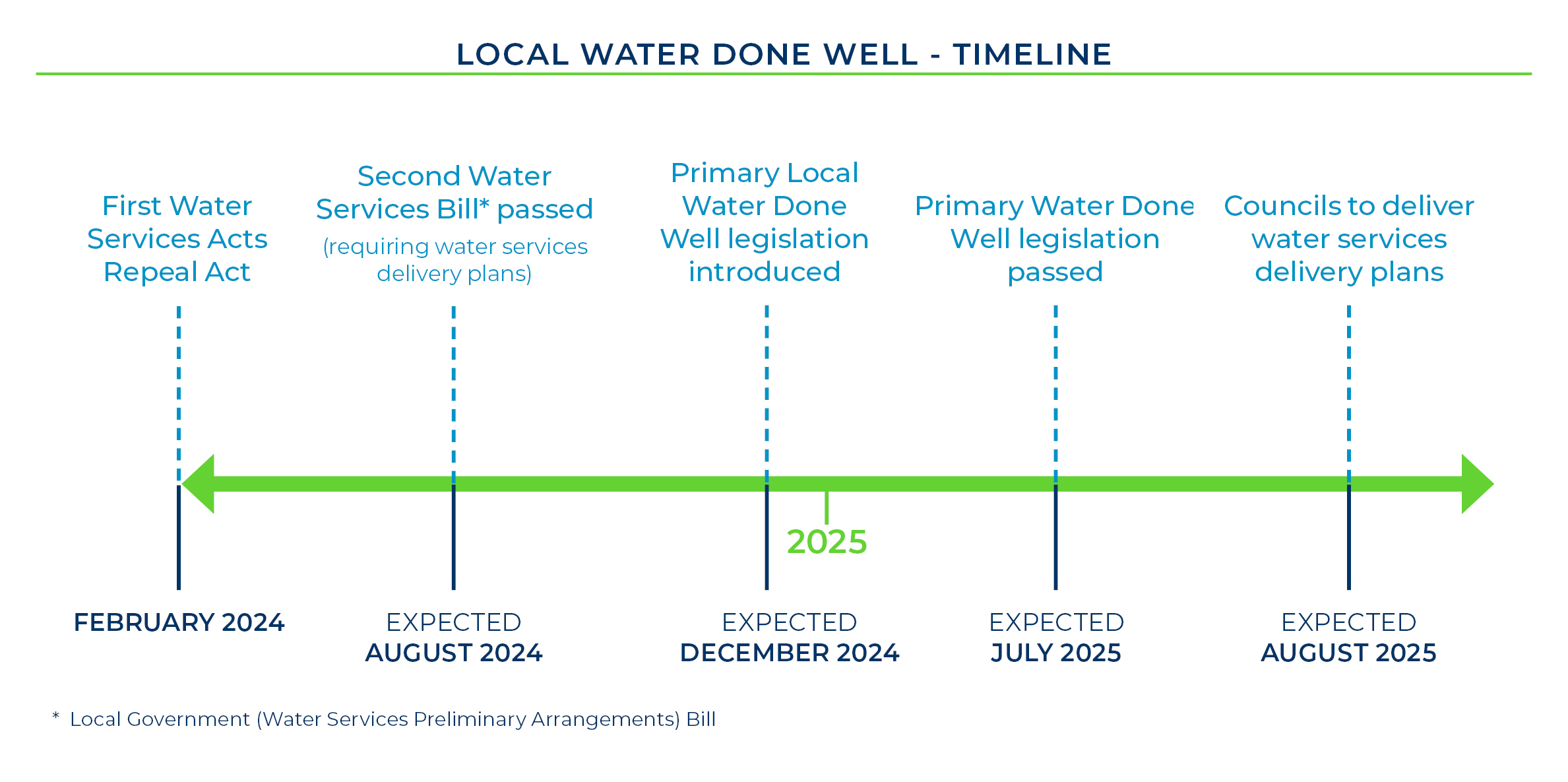The prior Government’s “Three Waters” reform programme was put on the scrap heap in February 2024. Since then, we, like many others, have waited with bated breath for the much-needed new plan. Encouragingly, further details of the Local Water Done Well plan to reform New Zealand’s water infrastructure have now arrived, following an announcement by Local Government Minister Simeon Brown and Commerce and Consumer Affairs Minister Andrew Bayly on 8 August 2024.
Local Water Done Well – what is it?
The aim is simple “This is about providing local government with the certainty it needs to deliver water services, while minimising costs on ratepayers”, Brown said.
At its core, new water services delivery models have been approved by Cabinet as part of the Local Water Done Well plan. The Government has also announced enduring components to assist water services delivery. The following diagram summarises some key features of the new models:

The Local Water Done Well plan now includes the following:
- Councils retain ownership of water infrastructure assets and services delivery:
While councils will be able to continue to deliver water services directly in-house within council, the plan will enable the establishment of new, financially separate, “water organisations”, which will be set up as limited liability companies. -
- These water organisations can be owned by a single council; jointly with other councils (to achieve cost savings, improve efficiency and affordability); jointly between a council and consumer trust (which must hold the majority stake) or wholly by consumer trusts. In other words, the water organisation may or may not be a council-controlled organisation (CCO).
- The boards of water organisations will need to be comprised of independent and professional directors.
- Where consumer trusts are involved, the water consumers will elect trustees to the consumer trust (similar to local body elections) who in turn play a role in appointing the board of the water organisation and monitoring performance.
- The Local Water Done Well plan has elements that apply to all water services providers (including councils that continue with direct (in-house) delivery through internal business units or divisions, as well as the new water organisations) and some elements that apply only to the new water organisations (i.e., the separate organisations established to provide water services, but not councils where they are providing direct (in-house) delivery).
- Access to finance:
- Water CCOs will be able to utilise debt from the Local Government Funding Agency (LGFA), if they are financially supported by their parent council or councils. Under the new plan, water CCOs will be able to leverage up to a level equivalent to 500 per cent of operating revenues – around twice that of existing councils, subject to meeting prudent credit criteria. The LGFA is the lowest cost provider of financing to local government as a result of its scale.
- The new models provide improved access to finance, allowing costs to be spread over a longer-term horizon, rather than needing to immediately increase rates and other revenue to fund the much-needed capital investment required in our water infrastructure. It is a welcome expansion of the LGFA’s scope, as many councils have a critical need to invest in water infrastructure, but are nearing their debt limits.
- Mixed council/consumer trust owned water organisations and wholly consumer trust owned water organisations will be financially independent from councils. This means borrowing will be independent of local authorities (for example from banks or capital markets) and subject to the water organisation achieving sufficient credit quality and track record.
- Funding for water organisations
- Water organisations will be able to assess, set and collect water services charges from consumers and will be able to use the development contributions regime in the Local Government Act 2002 to charge developers where additional demand or growth is created.
- Minimum requirements for all water services providers, including economic regulation and consumer protection:
All water service providers will be required to comply with a set of minimum requirements which are designed to promote efficiency, improve governance and management, and ensure accountability within the sector. The minimum requirements are likely to include that:- water services providers will be subject to greater economic, environmental and water quality regulation:
- As is the case with international airports, gas pipelines, electricity lines companies and fibre networks, it is stated that this regime will provide regulatory oversight to ensure water charges are fair and cost reflective, and that revenue is sufficient to meet investment requirements, as well as promoting efficient investment and maintenance so that water services are delivered at a quality that communities expect.
- The Commerce Commission will oversee the economic regulation of these water services. The Commission will have a range of regulatory tools to promote efficient practices and protections for consumers. The economic regulation regime will apply to drinking water and wastewater services and will provide flexibility to include stormwater services at a later date, if necessary.
- The Minister will be able to appoint a Crown facilitator – water services, and/or Water Services Commissioners, if problems (or potential problems) arise in councils or water organisations and, as a last-resort option, the Minister will have powers to help address significant or persistent non-compliance with the economic regulation regime.
- water services providers will be subject to a new planning and accountability framework, including a requirement for a water services strategy and annual reporting. Water organisations will also be required to have a statement of expectations;
- water services providers will be required to meet financial sustainability obligations such as ringfencing to ensure that water revenue is spent on water services;
- water services providers must act consistently with statutory objectives set by legislation; and
- water services providers will be subject to protections against privatisation. As noted above, it is expected that only local authorities and/or consumer trusts will be permitted to own shares in a water organisation.
- water services providers will be subject to greater economic, environmental and water quality regulation:
- Reducing burden:
The Government is also proposing several changes to reduce burden and to make it easier to deliver water infrastructure at lower costs. By way of example, the Government is proposing:- changes to the drinking water quality regulatory regime to reduce the burden and costs of complying with regulation for drinking water suppliers. In particular, the changes aim to reduce the burden for small, low-risk suppliers;
- to introduce a mandatory set of national engineering design standards for water services network infrastructure; and
- a new framework for the management of stormwater services which best suit a particular council’s circumstances. Councils will have flexibility to contract or transfer the delivery of a range of services (for example, maintenance and operation of the network, and/or technical and specialist advice to leverage the capability and capacity of the new water services organisations).
Local Water Done Well - where to from here?
The primary legislation to implement the new models is expected to be introduced in December 2024 and passed by mid-2025.
Under another piece of the new water legislation ecosystem introduced by the current Government (expected to be passed this month), councils will have 12 months to develop and deliver a water services delivery plan to central Government for acceptance by the Secretary for Local Government. These plans must:
- set out information on the current state of councils’ water services;
- set out a strategy for how councils will deliver financially sustainable water services; and
- meet regulatory standards and information to lay the groundwork for economic regulation of water services.
Water services ownership and delivery is complex, so it will be interesting to see how local councils across the country (each with their own drivers and circumstances when it comes to water) respond to the Government’s new plan and what models they look to implement – whether, alone, jointly with other councils or through community trusts.

For our part, we are hopeful that the introduction of the new plan will allow councils to move forward with delivering on their plans for improving New Zealand’s water services. Importantly, for change to be enduring, it is critical that a bipartisan approach can be reached on the new plan to enable greater and much needed investment into New Zealand’s water infrastructure assets and water services delivery.
If you have any questions about this article or water infrastructure more generally, please get in touch with the contacts listed or your usual Bell Gully adviser.


